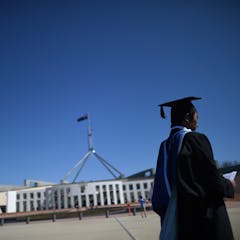
Artikel-artikel mengenai Job-ready graduates
Menampilkan 1 - 20 dari 40 artikel

Many business school graduates feel a gulf between on-the-job experience and study. This means they lack the skills to navigate ethical and other challenges in the workplace.

A multi-rate student contribution system could make average student debt repayment times similar across different courses.

The idea a generalist degree just leads to over-qualified graduates serving coffee Reality Bites-style is not only wrong, it is a misguided understanding of what we need from graduates.

Huge disparities in how much students pay for courses mean graduates of high-fee disciplines will take longer to repay their debts or might never do so. That will ultimately add to government debt.

Higher education didn’t feature heavily in the election campaign, yet the sector has high expectations of the new government. The key is the idea of an accord and the change in approach it implies.

The Coalition government showed a disdain for the arts, humanities and social sciences. The plight of these disciplines requires action from the incoming Labor government on three fronts.

Universities have seen a decade of cuts and unfavourable policies under the Coalition government. Here’s what the major parties should be promising now.

At the last election, Labor and the Coalition offered very different policies on university funding. Not so this time round, but the current flawed funding system could be improved further.

New research shows university students who gained entry via bridging programs outperform others who gain admission through ATARs and other means. They are also more likely to complete their degree.

Students matching the ‘traditional’ applicant’s profile see university as a stepping stone to a good job. Those from less-well-represented groups care more about higher education’s intrinsic value.

Artificial intelligence makes it possible to create a highly adaptable, module-based curriculum backed by a system that actively guides students’ choices based on their desired jobs.

The subsidies for student places up to 2024 fall about $1.1 billion short of the level needed to create the extra places the government promised its Job-ready Graduates policy would deliver.

The question for universities is no longer whether to offer work-integrated learning but how to do it well, especially now that digital technology has expanded the scale of what is possible.

Earth scientists are on the skilled occupation list for immigration even as universities cut back in this area. The problem lies with a funding model that offers no incentive to lift graduate numbers.

Liberal Prime Minister Robert Menzies insisted universities should have protection from political interference. But Bob Hawke’s education minister John Dawkins dismantled these protections.

Tight funding and COVID-related limits on face-to-face contact have forced academics to find other ways to expose students to the real-life work they are preparing them for.

The Job-Ready Graduates policy aims to remove ‘the misalignment between the cost of teaching a degree and the revenue that a university receives to teach it’. But new research challenges its costings.

Many Australian students specialise before they’ve had a good general education. American undergraduates do get that, and perhaps Australia has gone too far down the path of early specialisation.

The budget splashed out extra money for almost every sector deemed important to economic recovery (or politically sensitive). But with universities in a state of financial crisis, they missed out.

Tuesday’s budget shows a reversion back to the previous policy of keeping total higher education funding broadly stable.
